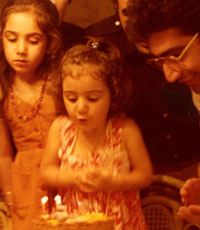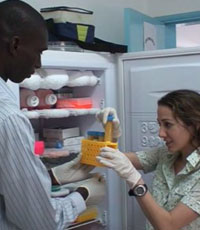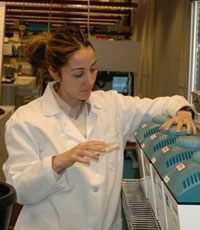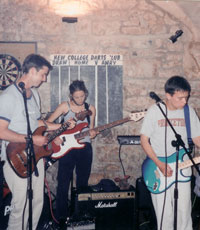


"It feels like when I'm the most scientifically active and my brain is churning out ideas," says Pardis Sabeti, "every once in awhile it spits out a melody." 
"The great thing about America is I've never felt like an outsider," says Sabeti. "I'm just a different piece of the puzzle." Sabeti and family celebrate her first birthday as an American. 
"We could potentially engineer new drugs to eradicate [malaria]," says Sabeti, here shown at a lab in Senegal, about her and others' work on the highly contagious disease, which kills over a million people each year. 
Sabeti here uses a thermal cycler, which creates several copies of a single strand of DNA. Thermal cyclers make it easier to analyze DNA and look for specific genetic information, such as when studying malaria. |
"If there's a trait for not sleeping," says geneticist and malaria researcher Pardis Sabeti, "I probably have it." A research fellow at the Broad Institute in Cambridge, Mass., the Iranian-born former Rhodes Scholar and graduate of Oxford, M.I.T., and Harvard also sings lead for her critically acclaimed band Thousand Days. In the following interview, follow highlights from Sabeti's work and life, and learn how this 32-year-old has already managed to accomplish so much. SURVIVAL OF THE FITTESTQ: You have a Ph.D. and an M.D., you teach, and you perform in a band. What do you say when people ask you what you do? Pardis Sabeti: Right now, that I'm a geneticist with an interest in infectious disease. I love everything I do, but one of the most exciting things for me is researching how we humans protect ourselves from getting diseases like malaria. Q: What do you mean by "protect ourselves"? Sabeti: It begins with natural selection, the idea that if people are born with a trait beneficial to their survival, those people will be more likely to live, have children, and pass on that trait. When I was working on my Ph.D., I developed a computer algorithm to look for rapid changes in populations' DNA. Our DNA changes constantly over generations, but if certain changes spread through a population more quickly than others, they are probably the beneficial results of natural selection. This is the protection we give ourselves to survive. Q: Malaria kills over a million people each year, but hundreds of millions more contract the disease and survive. How does self-protection play into this? Sabeti: We have actually identified genetic variants that keep some people infected with malaria from getting sick, and there are others that keep people from getting infected to begin with. It's important that we study these people's genes as well as the malaria parasite's genome to identify which traits allow it to survive most humans' immune systems and become resistant to existing drugs. We could potentially engineer new drugs to eradicate the disease and create treatments for people who aren't immune to it. Q: Is this already happening? Sabeti: It is. Several groups are working on this right now. Other groups are helping by trying to improve human health overall. I've been lucky to work with some really dedicated people on the United Nations Millennium Project, which focuses on reducing poverty and disease worldwide. My role with the malaria team has been to collect blood samples for analysis and look at the malaria parasite's infectious properties. It's been a rewarding experience, one that's given us a lot of data to work with. Q: How have malaria-resistant humans adapted to the disease? Sabeti: One famous adaptation is sickle-cell disease, which afflicts many people who live in malaria-prone tropical regions or whose lineage can be traced back to those locations. Sickle-cell is an interesting example because it illustrates why humans aren't yet totally immune to malaria. There's a trade-off: Sickle-cell is a blood disorder that, like malaria, can prove fatal, but while people who inherit the sickle-cell gene from both parents will get very sick, those who get it from just one parent tend to have fewer symptoms and have a greater chance of surviving malaria and living the longest. But these people couldn't exist without other members of the population getting both or neither of the genes themselves. If two parents have one sickle-cell gene each, there is as great a chance of their offspring being born with just one sickle-cell gene as there is their inheriting neither or both genes. Q: The algorithm you developed has brought a lot to the world of genetics. How did you come up with it, and what did it reveal? Sabeti: I honed the idea over many months as I was finishing my Ph.D. and also beginning medical school. There were a lot of late nights, and one night in my dorm room around 3 a.m., I finally had a working model of the algorithm. I applied it to look at a specific gene in some DNA samples, and the results were beautiful. I realized I'd found a trait that had to be a result of natural selection—a trait that likely helped the population I was looking at cope with malaria better than others. It was an amazing feeling because at that moment I knew something about how people evolved that nobody else knew. AN IRANIAN-AMERICAN CONNECTIONQ: You don't sleep much, do you? Sabeti: Well, if there's a trait for not sleeping, I probably have it. One time in medical school, after two days of being awake, I was on call all night, I went to the lab the next day, I gave a talk, I spent a lot of the day in meetings, and then I went to a party at my research advisor Eric Lander's house and played a game of football. And in two minutes I ran headfirst into a wall. Eric took me to the same hospital where I worked, and my own resident put stitches over my eye. It was funny because from then on, nobody ever felt badly for me again. They thought, "Oh, she's partying, so she can handle things." Q: What inspires you to work so hard? Sabeti: My family. We came to the United States from Iran just before the Iranian Revolution in 1978, when I was two. There was a lot of political turmoil and we had to leave quickly. My parents had to start over, learn a new language, and just get going. But I think in many ways being a child of a revolution was a positive experience because it made my sister and me really appreciate every opportunity we had. There's a sense of resilience that my mom and dad gave me that I love. It's this idea that no matter what happens to you, you keep going. As long as I have a heartbeat, I'm fine. Q: But this must have been very difficult for you and your family. Sabeti: My parents never wanted to talk about post-revolutionary times because they never wanted us to feel like anything bad was happening. They wanted us to immediately acclimate into American culture and just enjoy our childhoods, and we definitely did. The great thing about America is I've never felt like an outsider. I'm just a different piece of the puzzle. Q: Would you consider yourself very American? Sabeti: I speak Farsi at home and I'm definitely very tied to my Iranian culture, but it's really a mix because I do feel very American. I remember when my parents would take us to Disney World and how I really loved it there, especially at Circus World. On old family videos, you can hear me speaking in Farsi and then saying "Circus World" a lot—Farsi, Farsi, Circus World. It's funny, but it illustrates a lot about what life was like for us. One of the reasons that I can do many things like be a musician, a scientist, and so on is because I came from such a different culture into a new culture. And because my parents didn't know what American culture was, they just made it whatever they thought it was supposed to be—it became very fluid. There were no boundaries as to who we were and what we could do. A SCIENCE-MUSIC CONNECTIONQ: With everything else you do, what got you interested in forming a band? Sabeti: It actually wasn't until graduate school at Oxford University that I picked up the guitar and started singing on stage. I had two American friends at school who really loved music. They both had guitars, and they'd talk about being in a band but would never act on it. Finally, I told them to just do it, and they said, "We need a bass player." So I went out the next day, bought a bass, and learned to play. The three of us started writing songs immediately as the band 1001 Moose. By coincidence my current band is called Thousand Days. Q: Which of your songs holds the most meaning for you? Sabeti: Many of them have special meaning, but one favorite is the first song I wrote by myself, "Coming Up." I composed it in the midst of writing my Ph.D. thesis. It was one of those times when I would spend all day at the lab and then come home and need to detox from the day by creating something. I think that the creativity came because of all of the other work I was doing. It feels like when I'm the most scientifically active and my brain is churning out ideas, every once in awhile it spits out a melody. "Coming Up" is special because it was the beginning of that. [Go to the highlights of this interview to hear the song.] Q: How did you know that you wanted to be a scientist? Sabeti: Science has always felt very innate to me. I love the invention and the creation of research, and I love how my medical degree allows me to help people directly. But it's all a creative process, and I think that's how I became interested in music, too. What links music and science for me is that they're two different kinds of invention. My favorite part of music is writing the melody, inventing new lyrics, and thinking about ways everything will connect. Q: What would you say if someone told you to choose a single career path, science or music? Sabeti: I hope I never have to make that choice, but I'd definitely have to go with science. It's who I am and it's what I'm good at. There are so many aspects to science that I couldn't give up—the rigor, the discoveries, the teaching. The impact that science has on the world around us is something I'm enthralled with. I don't think anyone could ever take that out of me. SUCCESS AND FAILUREQ: How do you manage your time? Sabeti: People will often ask me how I do all the things I do, but I realized at some point that you can do anything if you love it enough. I don't think I do anything special. It's just that I stick around things that I love. When I do that, everything tends to fall into place very quickly. Plus, I have a lot of energy, and if I didn't have a lot of things to keep me busy, I think I would become insufferable. I think I only have two speeds: I'm either off or I'm on like crazy. Q: Are you a role model? Sabeti: I've never liked the term "role model." I'm just me, and there are plenty of things I would change about myself because I'm definitely not perfect. I do hope people see me as who I am: an Iranian-American, a woman, a scientist, a teacher, and so on. But I don't think people should want to be like me. Something more exciting to me would be if I could help other people become who they are inside and achieve their own goals. I hope that if I'm inspirational, it's in that way. Q: How do you handle failure? Sabeti: When I was a student at Oxford and struggling with some failing experiments, my advisor told me something that really stuck with me. He said, "I'm happy for the failures that you're having right now, because it's these failures that will keep you strong forever." He said that the important thing was that I accepted my failures because, in another decade when it happened again with something more important, I would be able to handle it. I think that's really important. I've had a lot of successes, but I've
definitely had periods of failure where I thought my work was going nowhere.
Because of my advisor, I always know that if I keep focused on the challenges
my failures give me, I will always be able to move past those failures onto
something else.
|
||||||||||
|
Interview conducted on July 19, 2007 at the Broad Institute by Robe Imbriano, producer for NOVA scienceNOW, and edited by Rima Chaddha, assistant editor of NOVA online |
|||||||||||
|
© | Created June 2008 |
|||||||||||
